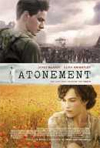2008
Main Movie
Page
Atonement
Boy in the Striped Pajamas
Brideshead Revisited
Counterfeiters
The Dark Knight
Enchanted
Frozen River
Indiana Jones and the Kingdom of the Crystal Skull
Iron Man
Juno
Man on Wire
Michael Clayton
No Country
for Old Men
Rachel Getting Married
the Savages
The Secret Life of Bees
Sweeney Todd
There Will Be Blood
The Visitor
WALL-E
Film
Reviews from 2007
Film Reviews
from 2006
Atonement is a highly praised new film, based on the honored novel by Ian McEwen. Since I had not read the book, I had trouble following the first part of the film, as it shifts perspective between three main characters. However, I stuck with it, and was rewarded for doing so. The basis of Atonement is the damage one lie can do to others in ways that one can never anticipate. Atonement opens in 1935 on one of those beautiful English estates we often see in the movies. In the early scenes, we see a budding romance between two young people, Robbie (James McAvoy) and Cecilia (Keira Knightly). The viewer’s main point of reference is Briony (Saoirse Ronan), Cecilia’s 13 year old sister. An aspiring writer, Briony writes a play for the other children at the estate to perform. She is a keen observer, and watches everything that Robbie and Cecilia do, often without understanding. Jealous of their close relationship, Briony tells a terrible lie that she soon regrets. However, the damage is done and cannot be undone. The film moves ahead five years to 1940. Robbie is a soldier in Dunkirk, as the British prepare to evacuate the continent. Cecilia is a nurse in London. At 18, Briony also is a young student nurse, living in London. She continues to write about her experience with the sick and wounded men for whom she cares. Briony also wants to meet with her sister, with whom she has been estranged, to ask forgiveness. The film jumps forward to the present day for the concluding scene with a brief, but luminous performance by the great Vanessa Redgrave as the aged Briony. As I mentioned, I felt a bit confused at the At the heart of the film is Briony, the keen observer of all, writing her stories of life in wartime London after the other young nurses have gone to bed. Through her writing, as well as her attempts to find and reconcile with Cecilia, Briony seeks atonement for her sin which has caused so much suffering. From a theological perspective, Atonement is an excellent reflection on the effect of sin, and the lifelong journey of Briony to atone for the sin of her youth. It’s not until the concluding scene that the full ramification of the sin and the quest for atonement are realized. I enjoyed Atonement for its rich detail and thoughtful approach to a topic seldom dealt with in film: the effect of one lie on so many lives. As Dominicans committed to truth, it’s a haunting testimony to our motto of Veritas in word and deed. Tom Condon, OP |
WINNER The
USCCB Office for Film & Broadcasting
classification is A-III -- adults. The Motion Picture Association of
America rating is R -- restricted. Under 17 requires accompanying parent
or adult guardian. |
subscribe to
DomLife.org and receive a free email update every two weeks. unsubscribe |



 Atonement
Atonement beginning of the film with
shifting its shifting points of view. However, I later appreciated
the need to establish the three perspectives as the film progressed. The
most engrossing part of the film is the middle sequence. Without
being graphic, director Joe Wright shows the horror and chaos of the
beaches of Dunkirk and the agony of the wounded in the hospitals of London. The
courage and dedication of the nurses who cared for them so untiringly
is also well documented. Wright does a great job bringing these
war scenes to life, effectively using sets, costumes, photography and
editing. One of Wright’s best devices is the frequent tapping
of a typewriter on the soundtrack, suggesting the literary instincts
of Briony.
beginning of the film with
shifting its shifting points of view. However, I later appreciated
the need to establish the three perspectives as the film progressed. The
most engrossing part of the film is the middle sequence. Without
being graphic, director Joe Wright shows the horror and chaos of the
beaches of Dunkirk and the agony of the wounded in the hospitals of London. The
courage and dedication of the nurses who cared for them so untiringly
is also well documented. Wright does a great job bringing these
war scenes to life, effectively using sets, costumes, photography and
editing. One of Wright’s best devices is the frequent tapping
of a typewriter on the soundtrack, suggesting the literary instincts
of Briony.